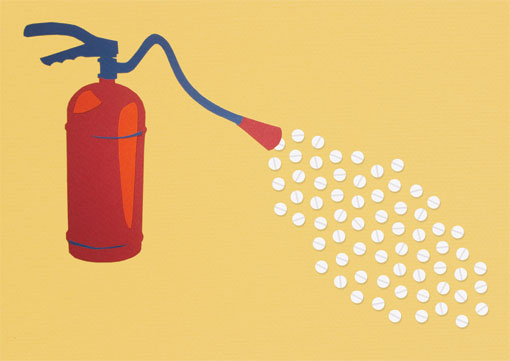Finding the Best Drugs to Stop Inflammation

FOUR MAJOR CLASSES OF DRUGS target inflammation: non-steroidal anti-inflammatory drugs (NSAIDs), such as aspirin, ibuprofen, and naproxen; disease-modifying anti-rheumatic drugs (DMARDs); steroids; and biologics, the newest weapons in the anti-inflammatory arsenal.
All these drugs, however, also suppress the immune system that protects us from disease. The drugs also come with a host of side effects, including stomach problems and bleeding (NSAIDs); high blood pressure, weight gain, and osteoporosis (steroids); and nausea, hair loss, and liver problems (DMARDs).
Researchers at UAB are particularly interested in the balance between help and harm for biologics, which can be very effective but bring an increased threat of infection, says rheumatologist Kenneth G. Saag, M.D., M.Sc.
Biologics, which can cost thousands of dollars per year and often have to be given to patients through injection or infusion, are genetically engineered proteins made from human genes. Unlike conventional drugs, they are designed to shut down the specific components of the immune system that fuel inflammation.
“Biologics offer a more delicate, targeted action versus the sledgehammer-like approach to inflammation of traditional medications,” Saag says. “Different biologics target particular pathways in the immune system.”
 Saag and colleagues are studying the risks of biologics and other drugs in adults, children, and the elderly, using large Medicare databases that now include linked pharmacy information.
Saag and colleagues are studying the risks of biologics and other drugs in adults, children, and the elderly, using large Medicare databases that now include linked pharmacy information.
“This richer dataset will help us make better population-based estimates of the risks,” Saag says. “That information will in turn help clinicians and medical policymakers make decisions about the best treatments for individual patients,” he says.
In rheumatoid arthritis, for example, using a biologic that modestly increases a person’s risk of infection might be considered acceptable,” Saag says. “In another condition such as osteoporosis, for which there are different, effective medications, a drug that increases the risk of infection may be of more concern, particularly in older people.”
Stopping the cycle of autoimmunity is a “balancing act of suppressing the disordered, uncontrolled inflammation of the disease without shutting down the essential functions of the immune system that keep us healthy,” Saag says. “And many would argue that the approaches we’re using are not specific enough.”
Even with targeted drugs like biologics, “we’re suppressing a factor that, while it may cause the inflammation of rheumatoid arthritis or another disorder, also has all sorts of other functions in the body,” Saag explains. “As we understand more about the biology and immunology of these diseases, we should be able to do an even better job in the future.”